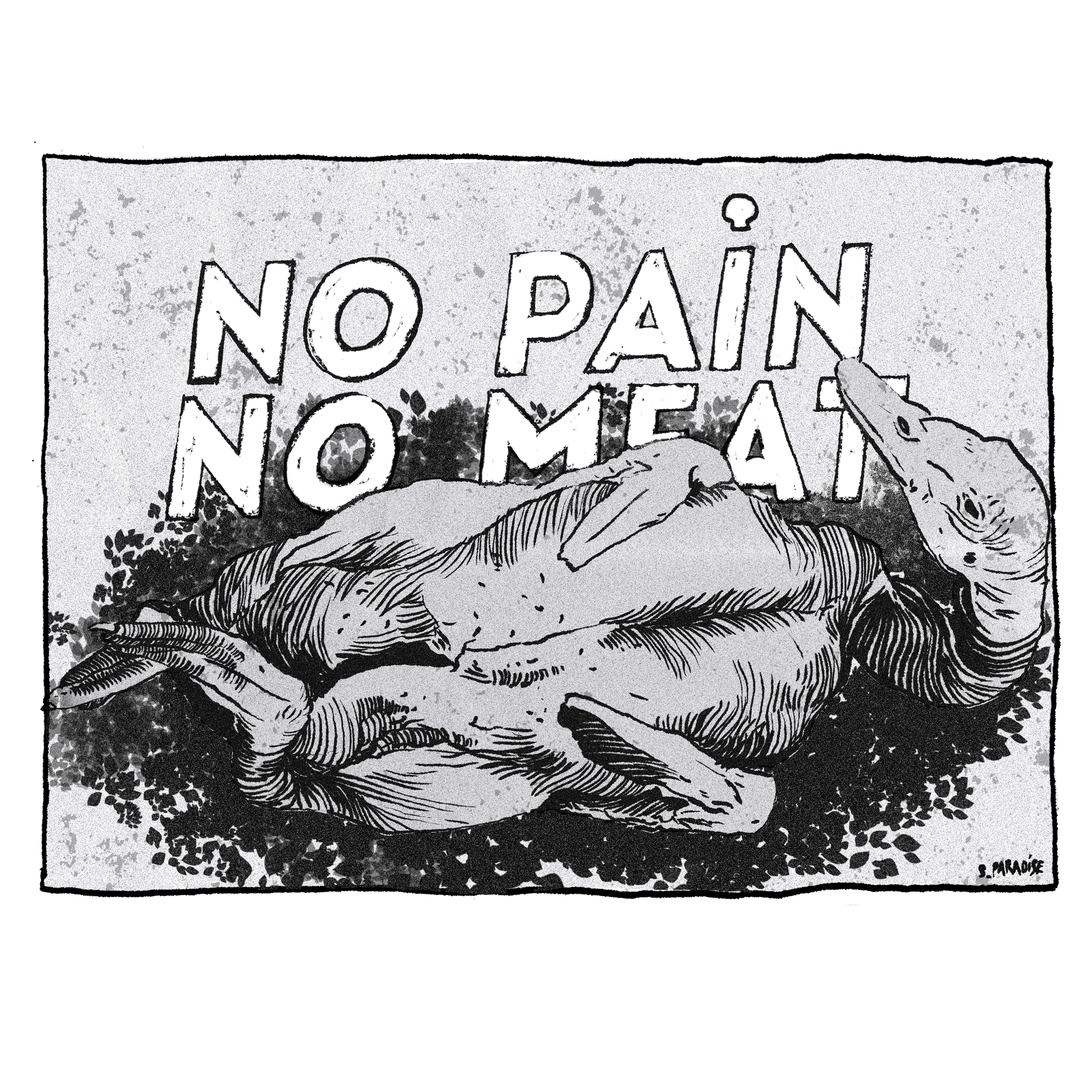BASTIEN BOUET-ANNOUN
Antispeciesisms
When your day is ending, his day is just starting.
Bastien is a strange kind of night owl. An anarchist punk running for elections. The kind of guy who would physically fight against armed people, who would bend over backwards to give a helping hand, and who would run 42km for the good cause. One of his good causes is the animal cause.
Bastien has been giving out almost all his energy for the last twenty years to the struggle against speciesism. It is the occasion for us to talk about veganism, and all that it implies. Because we like talking about ideas, but even more about action : the paths, the experiences, the direct action, the tangible !
Let’s go, Bastien, the floor is yours !
| By Myrtouille & Polka B. | Translated by Julie | Illustrations : Sal Paradise

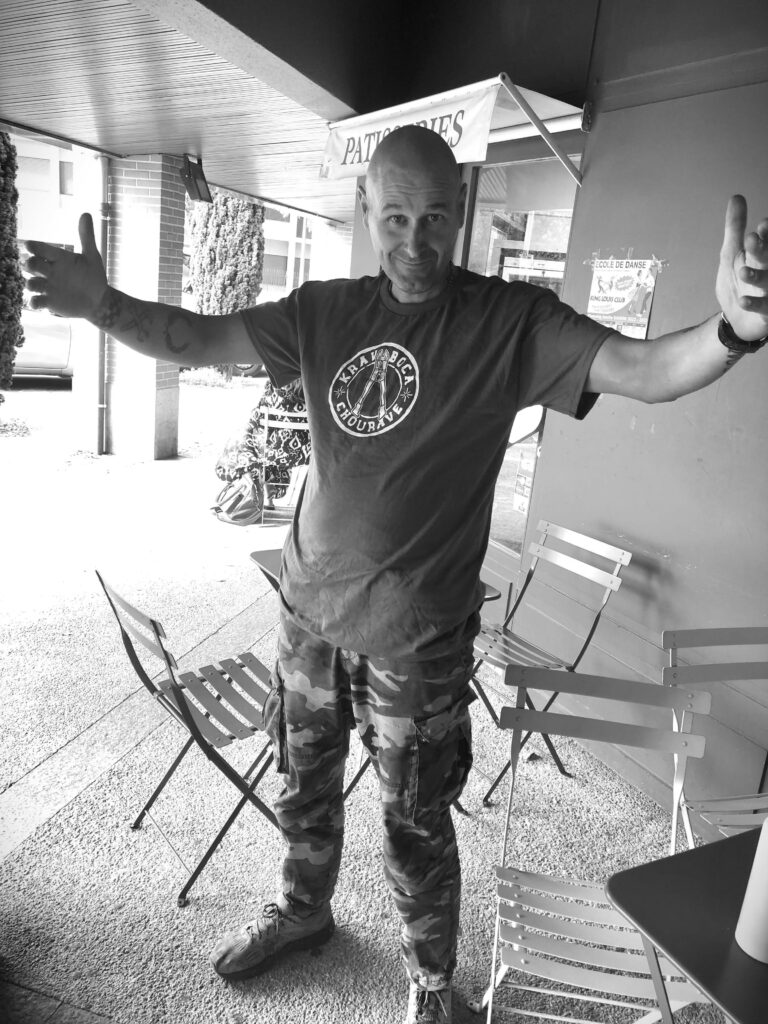
How did you discover punk ? Can you contextualise this particular era ?
My first musical stirs happened when I discovered rock, in particular ACDC back when I was in middle school. Back then, punk was more of an aura, an image. It was rare to stumble on a punk in the city. It was the beginning of the 90s in Normandy, in Caen, 10 minutes away from Ouistreham, where the boats leave for England. This is important because this is where I fist met punks. I was 7/8 years old. It was in 1985. We were near Juno Beach, one of the D-day beaches, so all of the schools around were twinned with English schools.
We were interested in the English way of life, as well as their contestations. To us, France was lame… Normandy, lame, so lame. People were reactionary and judging on the looks, so punk was emancipating us.
You did go to England?
Of course. We were underage so we sneaked out ! We skipped class on Fridays. On Thursday nights, we told our parents that we were going to sleep at a friend’s, and that we’d go to school together the next day. We then went to Ouistreham by bike, we tied the bike to a floor lamp, and we took the boat to England. We came back on Sundays. Hitchhiking worked well, so we went from Portsmouth to London in 2/3 hours, and we spent the weekend there. It boosted us. But on Sundays… Not only were we hungover, but we were so bummed to go back to our lousy town !
Did punk bring you to politics?
Yes, it did, because the second thing that attracted me was the lyrics. Me and my friends were so scared to enter the army back then, because the Iran/Irak war was still going on. Antimilitarism was our main political engagement. The answer to this was punk.
We recognised ourselves in anarchism rather than communism, because we couldn’t stand the valorisation of the State. The State makes the police, the school system, and it holds the baton.

How did you get interested in the animal cause ? What was your journey through these questions ?
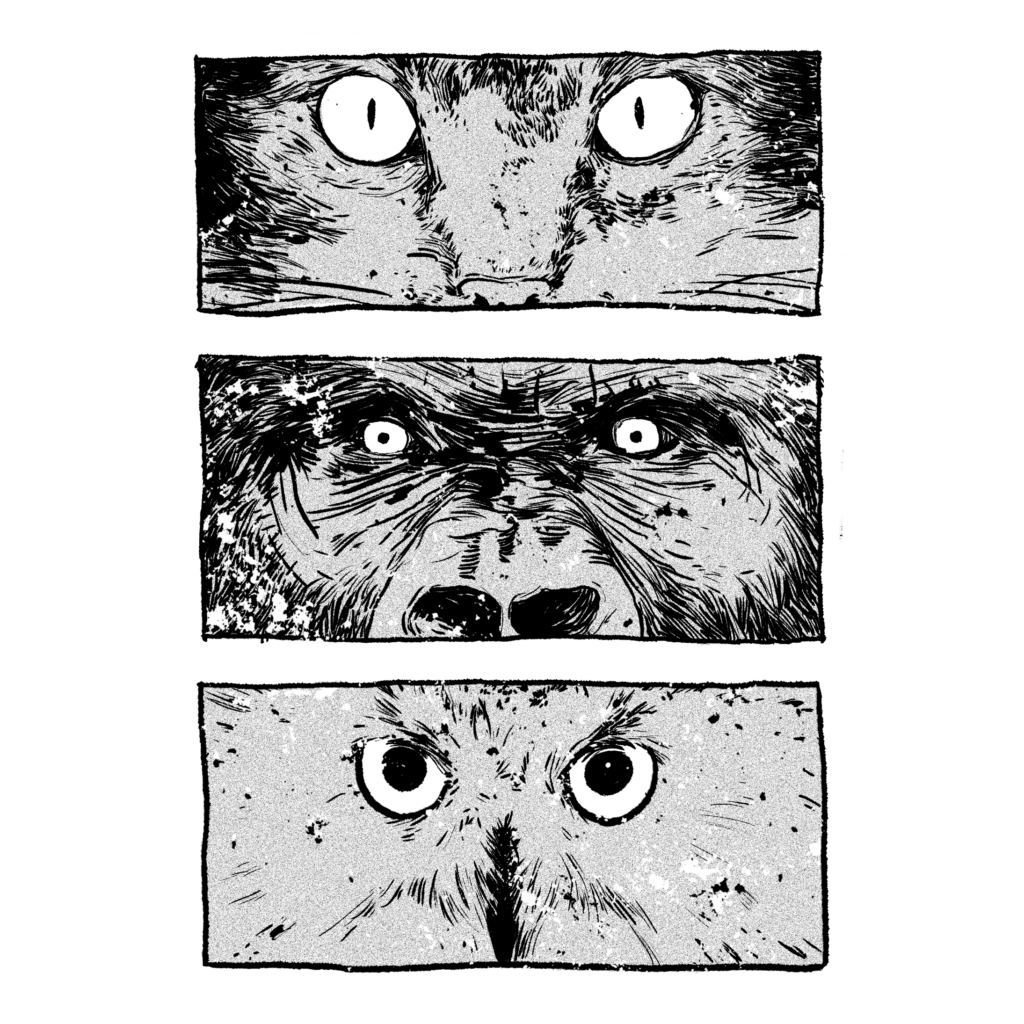
When I was a child, I was hypersensitive when it came to pain and suffering, may this pain be human or animal, with no distinction. It tormented me. When I saw pictures of tauromachy or heard about war, it literally kept me awake at night.
To me, the pain of any « sensible » being is equal. Until proven wrong, a plant does not suffer, and that’s why we eat hummus and not dogs.
But if you crush your cigarette butt on a dog’s thigh, it’ll scream, just like you would. There might be differences in the way we feel things, but the pain is indeed here.
When did you become a vegan?
I was an early vegetarian, in 2001. Then I later became a vegan, when I was 36/37 years old, in 2014. I went this way because I realised that there was very few activist forces oriented towards fighting animal pain, compared to human pain. And of course there is not enough activism about human suffering, I’m not saying there’s enough, but I’m saying that animal suffering is impossible to really quantify. It is not an affective choice, it is a reasonable choice. There is an abyss of suffering : 3 million animals are killed every day only in the French slaughterhouses, and the conditions we know. Veganism is a way to attenuate animal suffering at an individual scale.
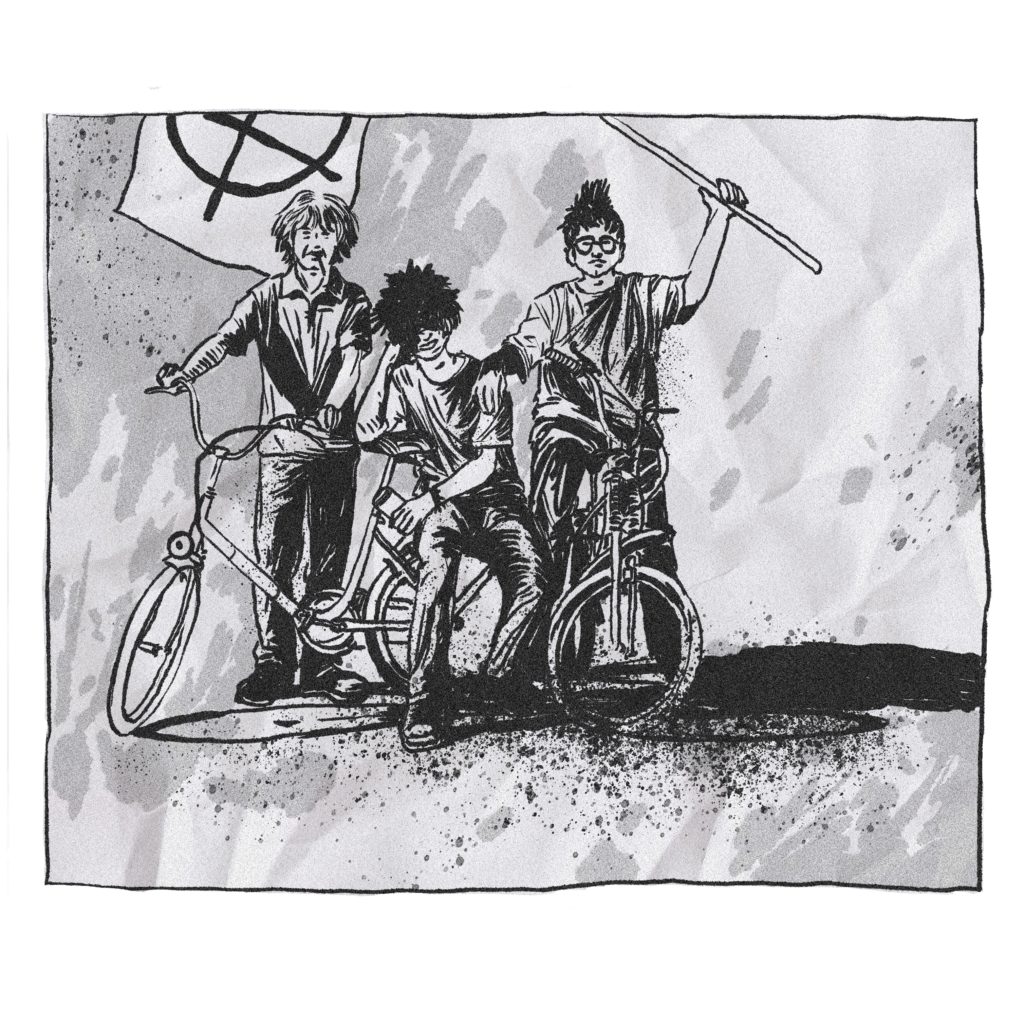
You already had a political involvement back then. What makes the antispeciesist movement particular? How did you get involved in it?
The antispe movement is particular because animal suffering is such that the activists feel things on a quite personal level in the struggle. It’s hard because there is very little evolution. Even if people are getting conscious, facts are not following. This is why I got involved in this fight.
I joined organisations like L214. With a friend, called Carole Maure, we opened its first branch in Toulouse back in 2017. Then, when the Animalist Party came up, I ran for the legislative elections.
I can look strange, coming from me, since I am not favorable to republican instances.
But there is something we must concede : animals suffer whatever the social model. There are things, right now, can only work through lawful and legislative ways, in order to drastically alleviate animal suffering.
We can take the example of caged chicken : suppressing the cages won’t prevent the death of the chicken, but it can improve their lives. In fine, I am fighting for the end of animal breeding.
It is not an « emotional » approach, contrarily to what you might sing. It is a materialist approach, through pain and suffering. If you put an animal in a really small place for its whole life, it’ll be less at ease than if it were outside. If you kill the animal after 16 months, you shorten its life of 10 years compared to its natural death.

Appart from veganism, what are your other means of action?
There are many illegal actions that I won’t tell you about because I still have trials going on.
It is an interesting thing about antispeciesists : the question of effectivity surpasses the legality.
In a world where animals are treated like objects (as written in the law), we do not respect laws that don’t recognise them to protect them. The guys who sequestrated a fox and tortured it for a whole night are not found guilty by the Law.
If it had been a domestic animal, however, there would have been charges (« serious injury and act of torture on a domestic, captive and tamed animal »).
It is precisely this kind of lacking that makes me want to compromise in politics, and to play with the legal framework. Antispeciesists break the law because they see it as immoral.
In the end, to us, a good action is an efficient action. L214 act on both sides : they have an illegal part (stealing pictures, filming inside the slaughterhouses…), and a legal part that consists in, for instance, lobbying in the big companies.
It is a courageous engagement. Not only do you risk a lot regarding the law, but also your adversaries (such as the big companies) are extremely powerful. They hold the power, the networks, and the money.
I am not a public personality, but one of my friends, Eddine Ariztegui, who is elected in Montpellier, has been active regarding these questions. He received a lot of backlash like intimidations and death threats, partly because he contributed to making Montpellier the first big city where hunting is not permitted in France. Animalists are not generally people who were destined to have a political carrier. In general, their personal life was better off before that !
Is your involvement in the Animalist Party a way to make this struggle more visible ?
We obviously wouldn’t have won the election. Indeed, we scored less than 2%. The thing is that it is a strategy that has many steps.
We know that the people who voted for the Animalist Party voted exclusively for the animal cause. And this is infuriating for the other political parties, from the left to the right, because they realise that they can’t monopolise this subject. In a way, it is a lost 2%.
What we want to do is show that there is an electorate for this matter.
Then, we want the other parties to take hold of this matter. It’s a tool ! We started from zero… We need victories, it’s the priority.
When you say that « animal suffering is bad », everyone can probably agree. The thing is, once you put aside the moral judgement, nothing seems to be changing…
Exactly. Until recently, there was no animalist politics in France, unlike in the Netherlands or Germany. It doesn’t mean that the Animalist Party denounces the underground organisations.
It’s just that the public political wing did not exist before. Medias need advocates.
It’s sad, but at some point you have to forget some of your values and play that game. I repeat it : animals don’t care whether their voice is amplified by a small association, or big political Party, or a group of anonymous vegans who break windows. We all act for the same cause.

There’s a question that we should have asked earlier : how do you explain the concept of antispeciesism to somebody who’s never heard of it?
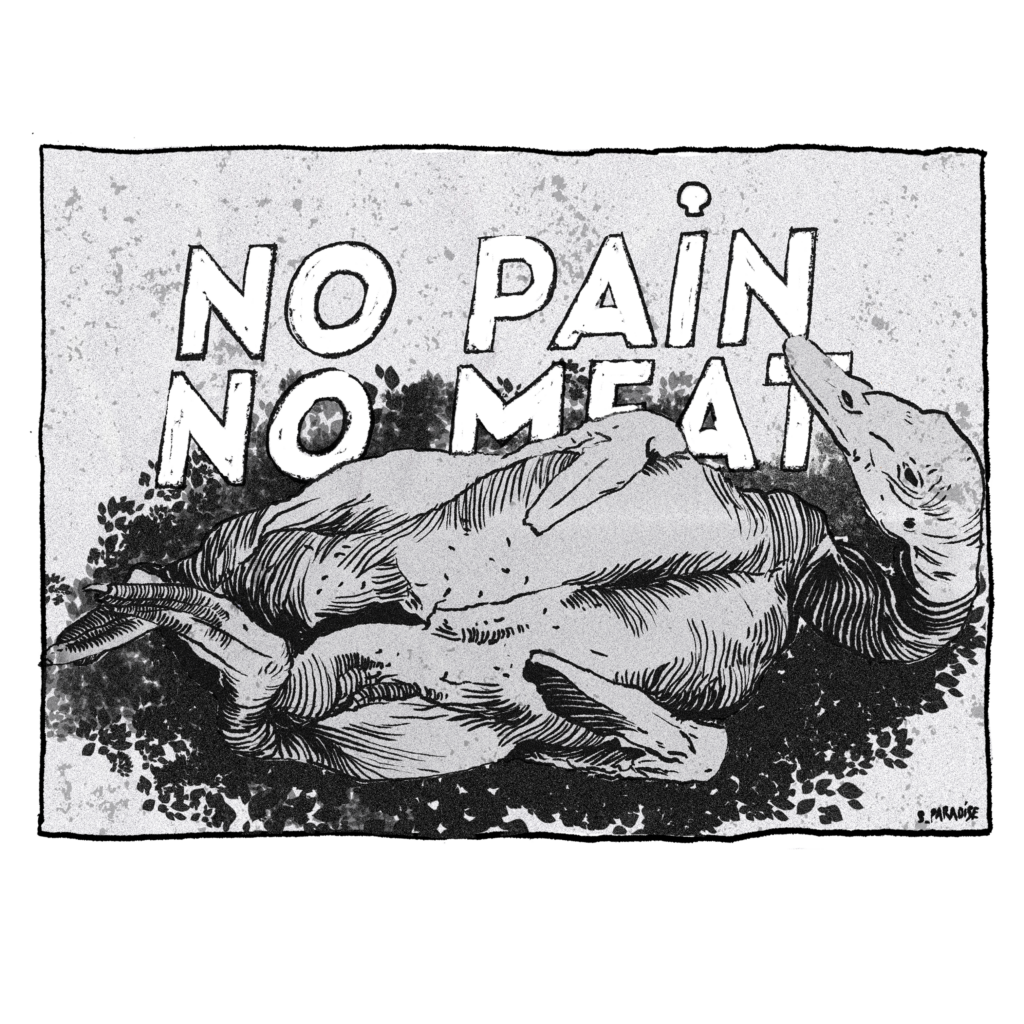
I’ll start with defining what speciesism is. It is a system of ideas and practices that puts a frontier between the way we consider humans and the way we consider other animals; but also between the way we consider different groups of animals (domestic animals or breeding animales, for example). We want to fight this system, through veganism for example.
Let’s be clear, we do not want to give equal rights or whatever ! We want an equality of consideration (meaning an equality of interest), regarding one criteria : sensitivity.
To us, the criteria of the species is not determinant in the recognition of one’s pain or suffering.

It’s important to state that this is not an emotion-based way of thinking. When invited on TV shows, vegan activist are often stigmatised in order to discredit the logical arguments of antispeciesism. Isn’t this a communication war ?
Maybe I shouldn’t have mentioned my childhood hypersensitivity (Laughs). But yes, antispeciesism can even be the result of a cold approach. We don’t watch slaughterhouse videos while crying on a Saturday night !
The media often picture antispeciesists as extremists in order to discredit them. It results in meat-eaters feeling attacked, even if they don’t even have anything against antispeciesism to begin with.
What would be, according to you, a better approach so that people who eat a meat sandwich don’t feel shamed ?
It’s all about tempering. The media tends to distort what associations, political parties or even individuals say, and make them look like something they are not : people who personally attack other people. What we want to attack is the system (the politics, the laws…), not the people ! Nobody chooses to eat meat when they are born. We are getting used to it. We are forced into thinking it is a « natural » thing.
It doesn’t mean that we don’t hold accountability and responsibility once we’re adults, but feeling guilty about it isn’t worth it. And there are different grades of guilt. You can’t compare a simple meat consumer to the C.E.O. of the Bigard slaughterhouses, 50th wealthiest person in France, multibillionaire, who sends tens of millions of animals a week to die.
The word « extremist » isn’t used lightly. It has to be said : our country is very reactionary. In France, tauromachy is a mafia. They are almost activists ! We’re talking about some 200 000 people managing to keep this tradition alive in 10 French departments.
It’s the same with the hunters. They are way more determined than the animalists. Their organisation is frighteningly effective. They all contribute to the national confederation through the departmental federations. There are no clans. This system was created by the Maréchal Pétain back in 1943 (you get the vibe…). So there is a national president, and departmental bureaus that are very active, with lists of all the adherents. As soon as a law project questions their right to hunt, they stumble in the offices of deputies, members of the parliament, senators…
They are visible and organised. I’m sorry to admit this, but they are way more strategic than we are.
Is this the reason why antispeciesists are so united ? Because there is an actual danger from the other side, determined people, that own weapons…
Yes, and in the countryside they benefit from a sort of impunity, just like the police. I often compare hunters and cops. In our world, there is nothing worse than the feeling of impunity. I’m talking about a real impunity. They can kill and not go to prison. But I get it, when you know that nothing is ever gonna happen to you, you take advantage of it. In the national imagination, the image of the family’s patriarch, with a farmer’s good sense and a good knowledge of hunting is very valorised.
I know some activists who would interfere directly between the prey and the hunter. This actually led to a decree in 2011 against some activist from the Animal’s Right association. The hunters succeeded in their lobbying, and manage to create a new offence called « impediment to hunting ». It actually is forbidden by the law now.
Can we still rejoice about potential evolutions ?
It’s never as fast as we would hope but I am very optimistic. There is a generational effect. The youth is more vegetarian, more sensible and more prone to gain interest in these questions.
Some elected members of the Animalist Party have managed to propose vegetarian options at school. Where there is an alternative, young people (that are less than 35) are inclined to opt for those alternatives.
It is more difficult to change someone’s way of thinking when they are over 65, especially about their eating habits. It is not about blaming old people, it’s really a fact.
25 years ago, our voice was absolutely ridiculed, we were seen as sectarian, or just on the verge of dying (or both!). It was complicated, and really not visible in the media.
Isn’t it a particularly discredited subject, when compared to all the catastrophes and urgencies in the world, the wars, etc ?
Yes, it is the argument of « priority » when facing different emergencies. They all tell us that there are more important things. But when they look at images of executions in the slaughterhouses, they calm down a little
With time, I’ve also learned that you shouldn’t talk with everybody. We don’t have to convince the whole world !

